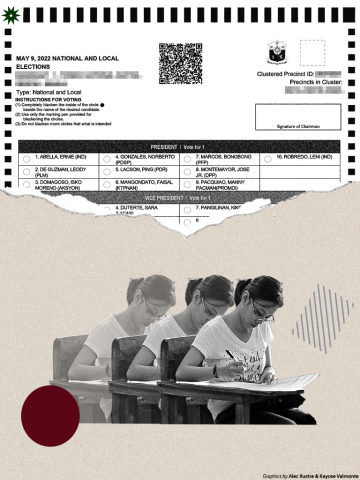EXCEL2022 launched a three-episode podcast concerning the upcoming May National and Local Elections titled AdvocaSERIES: On National Elections, aimed at fostering a healthy political discourse toward choosing the next leaders of the country.
Released weekly from March 25 to April 8, the three sessions were titled, Halaga Ng Boto Mo, Ano Nga Ba Ang De-Kalidad Na Kandidato?, and Tungkulin Ng Mga Botante.

Responsibility beyond research
With the prevalence of disinformation on the internet, voters are responsible for doing research on the candidates and their platforms. Chairperson of the DLSU Committee on National Issues and Concerns Dr. Jazmine Llana opined, “It’s not only about the right to [vote] but the obligation to vote well, and voting well would mean that we need to scrutinize who these candidates are.”
While doing research is a strong tool to be informed about their platforms, holding conversations are also essential to facilitate political awareness. Dale Ng Tio (II, PHY-PMD) put forward that while these efforts may not convince everyone to believe what is true, he trusts that “it will help them (voters) think and become Filipinos that can truly vote for the right people.”
Despite the efforts to educate people on candidates’ platforms and political consciousness, Llana asserted that the history of voting in the country and its consequences to its voters should be taken into account. “The appreciation of that sacred duty of a voter is not the same across groups of people in the country…and I can understand [why] vote-buying works,” she explained.
Meanwhile, Co-Convenor for Social Formulation and Advocacy of the Center for Social Concern and Action-Lasallian Outreach and Volunteer Effort (COSCA-LOVE) Shannen Solatan stated similar sentiments, as she herself engaged with people on the ground.
Voters residing in rural areas tend to choose candidates who are familiar with them as they have limited access to information, Solatan claims. “Before you shame people na ‘di sila marunong bumoto ng tamang kandidato, you really have to know where they are coming from, and from there, talk to them [and] engage with them.”
(…they do now know how to vote for the right people)
Setting standards high
As candidates hold campaign rallies and engage in debates, their platforms reflect their priorities and the policies that they will implement should they get elected.
Highlighting this, Ng Tio pointed out that as we look into the qualities that the leaders must have, delving into pressing national issues is key to knowing which candidate to vote for. Citing corruption as one of these, he voiced out, “To fight corruption, we need a leader that is accountable to the people and to the nation.”
Solatan expressed that it is also important to scrutinize the candidates and their accomplishments beforehand as this would indicate their actions toward the people and reveal who they are as people. “Ano ‘yung ginagawa nila? So from there, you’ll see [what] their real intentions are and who and what sectors they [are] really representing,” she asserted.
(What did they do?)
Meanwhile, Llana stressed that candidates must uphold democracy in governance, allowing people to express their democratic rights, “We need a leader who can enable the democratic process, not only during elections but during the actual governing process.”
Rights and responsibilities
Aiming to address voter disengagement and apoliticism, the podcast series highlighted the critical significance that voter engagement plays in defining the Philippines’ future by providing information to recognize the duties of Filipino voters.
COSCA Advocacy and Adult Formation Coordinator Angelo Herrera expressed issues afield vote-buying and other influencing factors by emphasizing the importance of voter participation. “Mukha ngang nakaligtaan nang husto. The Filipinos have forgotten the importance of the vote,” he stressed.
(It seems to have been completely forgotten.)
In line with issues of complacency and apoliticism, President of University of the Philippines University Student Council Jonas Abadilla also mentioned the importance of voter’s education to instill a sense of responsibility in participating in political engagements. “Mahirap tayong makapagbigay ng mga importanteng datos o impormasyon sa mga Pilipino kung mismong sistema ng edukasyon ang naghi-hinder sa’tin to give these kinds of information,” he maintained.
(It is difficult for us to provide important data or information to Filipinos if the education system itself is preventing us from giving these kinds of information.)
The speakers remarked that recognizing the importance of voting, identifying the characteristics of effective leaders, and examining specific candidates begin with casting a single vote.
